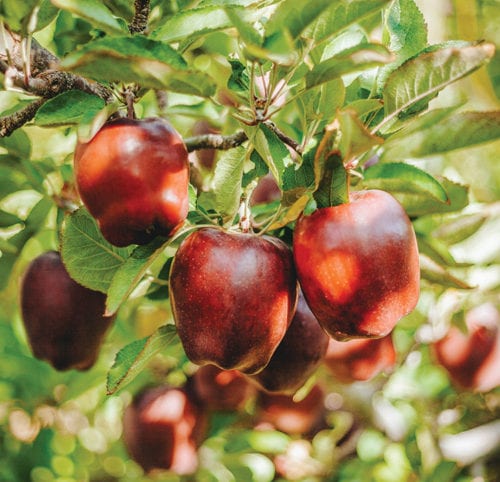
Home » Fewer apples heading to market
Fewer apples heading to market

June 14, 2021
Fewer apples are going to market in 2021, but this isn’t really a complaint.
“This has proven to be very advantageous as far as Covid and trade issues go,” said Todd Fryhover, president of the Washington Apple Commission.
The industry expects to harvest 122 million bushels in 2021, compared to 134 million in 2020.
Apple growers struggle with the same challenges as other crop tenders, and the challenges tend to repeat year to year, with the exception of Covid-19 arriving on the scene in early 2020, upsetting not just the apple cart, but creating long-lasting impacts on an industry already pushed to the brink with labor shortages.
“It was a very difficult year for Washington apple growers,” Fryhover said.
Safety requirements to prevent the spread of Covid-19 have resulted in major capital expenditures that couldn’t be solved overnight.
“The orchards were being impacted heavily, just as workers were coming in,” Fryhover said. “A grower who might have an eight-bed facility can now only put four people in there. A bus that used to carry 40 can now carry 20. To their credit, they figured it out.”
Growers using the federal government’s H-2A guest worker program saw costs skyrocket last year to maintain mandatory safe distancing standards while working and in housing quarters.
The program allows for the temporary employment of foreign workers in the ag industry. It comes at a hefty expense for the employer, requiring them to cover travel costs and housing.
It’s an investment that has paid off as cases of Covid-19 remained low among workers brought to the U.S. through the program, said Dan Fazio, executive director of Wafla, formerly known as Washington Farm Labor Association.
“We’re the best in the country by a long shot,” he said.
Those coming to the state through the H-2A program are tested for Covid-19 within 48 hours of arrival, and then scheduled for a vaccination.
Workers are aware of the testing and vaccination requirement before signing on for employment. This contributes to a high compliance rate.
Fazio said since the start of the year, less than 20 positive Covid-19 cases have resulted from nearly 8,000 H-2A workers transported, keeping the workforce safe while fulfilling the ongoing demand for labor.
State’s top crop
Apples are Washington’s top crop with a 2020 value of $1.95 billion.

The crop continues to face growing threats from other markets due to taxes leveled during the Trump administration that are unlikely to be rolled back right away.
“It doesn’t appear that this administration is going to do anything different in China than what’s been done,” Fryhover said. “There’s so many more important things to tackle. They acknowledge the situation and would like to have it corrected, but it’s going to take time.”
For the last few years, both apples and cherries from Washington have faced a 50% duty on imports to China in what’s considered a retaliatory tariff to counter taxes placed on imports like steel and aluminum.
The taxes are higher in India where a 50% tax is leveled on all imports, regardless of origin country, with an extra 20% duty added just for U.S. products.
“A 70% duty is nearly doubling the cost of your product,” Fryhover said.
This creates an increasing danger to the Red Delicious market, which makes up 90% of the apples shipped to India.
Fryhover said the taxes have opened up competition with countries offering substantially lower apple prices, like Turkey and markets in the European Union.
Other countries continue to encroach on the Washington state-dominated apple industry, which represents 95% of all apple imports, even as interest in apple varieties diversifies.
“We’re growing more Galas now. It’s the No. 1 variety grown, and we’re seeing more interest in Galas in India,” Fryhover said. “Galas are also being serviced by Poland, Turkey and Italy, which are closer, and don’t have the additional duty.”
Mexico remains the top buyer of U.S. apples, but is considered almost an extension of the domestic market due to its proximity.
Changing buyer habits
The shipment of apples saw a pivot in 2020, not just from a continued shortage of shipping containers and port shutdowns, but from the way the pandemic created a shift in consumer buying habits.
Shoppers were making fewer trips to grocery stores, and when they did go to the store, they often wanted to buy apples in a larger quantity, quickly and efficiently.
This increased the demand for pre-packaged bags of apples.
“They could basically walk in and pick up three pounds, four pounds, five pounds, whatever they wanted, and keep right on going,” Fryhover said. “So that’s been a big change, and the reason it’s been difficult in our industry, is that we’re not set up to do bags.”
Shipping apples in pre-packaged bags is a departure from the typical “trade pack,” or carton, of fruit usually packaged in cardboard.
The change in packaging came on top of previous adjustments by shippers to allow for social distancing on the packing line, creating inefficiencies and greater costs.
“None of the farmers had any problem spending whatever it took to keep their workplace safe,” Fazio said. “The farmers knew they weren’t going to make any money last year because they were going to spend it all on Covid safety.”
But farmers are still in the business to make a living, and Fryhover said last season was “one of the worst” from a pricing standpoint.
“If you think about packing a box of fruit and it costs you $10 to pack it, and now you need 20% more people and bags, the cost goes up to $12,” he said.
New varieties
Washington Tree Fruit Association President Jon DeVaney is hopeful the state will be “moving out of a Covid environment by apple harvest.”
Excitement remains for Cosmic Crisp apples, a new variety exclusive to Washington growers that burst onto the scene with much fanfare at the end of 2019, following years of promotion to pump up anticipation. Prices started high for the first shipment and have since come down.
DeVaney said many planned in-store samplings were canceled in 2020, but the industry still hopes to find ways to introduce customers to niche varieties like these.
“The good thing is people generally know what an apple is. It’s still easy and familiar to them,” he said.
Fryhover pointed to limited data on Cosmic Crisp and worries about displacement of other varieties as the per capita consumption of apples remains the same.
The next bestseller might still be on a tree, as there are dozens more proprietary varieties in production in Washington, offering improved texture and a specific taste.
“Which one’s going to win? Which one isn’t?” Fryhover mused. “Out of the 40, there might be 10 or 15 losers in there.”
It’s a gamble for a grower to bet on the capital costs, which are often substantially higher with new varieties, and hope to have a market winner.
Moving beyond Covid-19
As the 2021 growing season nears its conclusion and fall harvest begins, Fazio would like to see easing of Covid-19 safety rules, citing the stringent testing and vaccination process.
“We licked Covid with this H-2A program. But we can’t do the program with half the beds,” Fazio said. Wafla is part of a lawsuit filed against the state over its Covid-19 restrictions in the workplace.
Despite the smaller crop volume forecast for 2021, the industry expects the remainder of the season to transition smoothly from one crop year to the next, running from August to August, with most apples harvested in September and October.
The disruptions created in the last year have, at the least, made many consumers more aware of supply chains and what it takes to even get products onto shelves and into homes.
“Whether it’s public policy, weather or other issues, our growers and packers do an amazing job getting safe and healthy food out year-round despite these challenges,”
DeVaney said.
Focus Magazine Agriculture + Viticulture
KEYWORDS june 2021





